

You know that feeling you get when you fall in love with a band’s debut album, only to be disappointed when, a couple years later, they release a total stinker?
Supergiant Games has no intention of letting you down like that.
Nearly three years after the release of their debut hit Bastion, Supergiant has returned in the finest form imaginable with Transistor, a spiritual sequel that more than lives up to the reputation established by its predecessor. With their sophomore effort, Supergiant have made an even better game than their first, and proven themselves to be a studio capable of consistently knocking it out of the park.
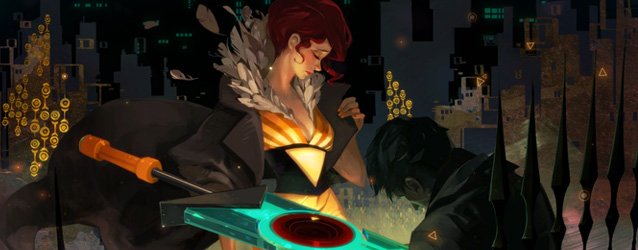
From the very beginning, it’s clear that Transistor is something special. There’s an intangible feeling a game gives you when every piece of it fits together perfectly, and this is a game that will nearly overwhelm you with that feeling. From the beautiful art direction, to Darren Korb’s fantastic soundtrack, to the smooth narration of Logan Cunningham, all the elements come together - just as they did in Bastion - to form an overall aesthetic that is amazingly cohesive.
It’s a more mature and nuanced version of Bastion’s aesthetic, too. Instead of a series of floating tiles, Transistor’s world is a fully fleshed-out cityscape of astounding detail. Instead of the passive storyteller of Bastion, the narrator of Transistor feels more like a sidekick, and has a rich, detailed relationship with protagonist and player character Red. The artifice that was so apparent in Bastion’s presentation has been more cleverly obscured this time around, and the result is a game that does a better job of getting out of the way and letting you experience its story.
The story itself is no slouch either. Well-paced in a way that makes it easy to lose track of time, Transistor’s plot is full of interesting characters and poignant lines of dialogue. The recurring line “See you in the country,” and all that it implies about Transistor’s world, will be stuck in my head for quite some time.
Moreover, the story feels like it has something important to say for itself. Transistor offers commentary on the concepts of encroaching totalitarianism, censorship, and the relationship between a city and its inhabitants, resulting in a game that has more to offer than simple escapism. In a medium that has only recently begun to come to terms with the inclusion of allegory and serious social commentary, Transistor can hold its head high as an example of how to walk the fine line between heavy-handedness and obscurity.
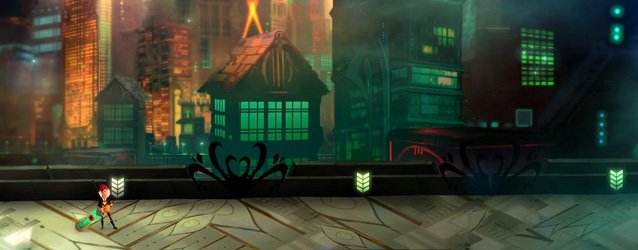
Combat in Transistor is an improvement over its predecessor (we’re beginning to see a theme here). The core experience remains quite similar, with fast-paced hack-and-slash combat being observed from an isometric viewpoint. The equipment system has been given new depth, however, with passive abilities and modifiers complementing the array of equipable attacks. Mixing and matching the different “Functions” leads to a bewildering number of different combinations and playstyles, and I can already tell I’m going to want to play through this game again to try out more of the different loadouts.
Perhaps the biggest single advancement from Bastion’s combat is the new “Turn()” system, which allows the player to queue up several moves while time stands still. When Turn() mode is activated, an action bar appears, and every movement and attack you queue up fills a portion of this bar. Once it’s full, Red rapidly performs all of the queued actions at lightning speed, and then has to dodge and hide from enemies until the action bar is refilled. It lends the combat a deeper, more tactical feeling than the frantic chaos of the real-time combat, and when combined with the aforementioned ability modification system, makes an interesting challenge out of trying to maximize the damage you can do in a single turn.
In addition to the fights that make up the bulk of Transistor’s main arc, there’s a series of optional skill challenges squirreled away in backdoors throughout the city. From horde mode challenges, to tests that require you to kill a collection of enemies with a single Turn() bar, these side quests provide a welcome break from the intensity of the core storyline. Again, I can tell I’m going to want to go back and complete all of these on a future playthrough.
Fortunately, the inclusion of “Recursion” mode, a form of New Game Plus, allows you to start the game again from the beginning once you beat it, retaining all of your unlocked goodies. I’ve only just begun this mode, but so far it looks like the enemies become commensurately stronger, making for a fairly challenging second playthrough. I’ll be embarking on mine in earnest quite soon.
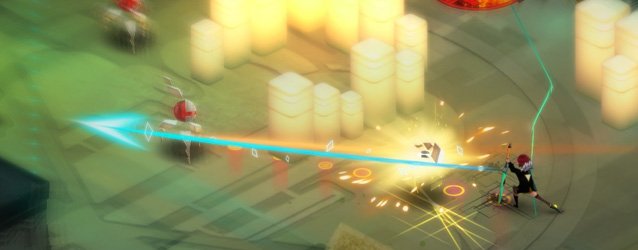
Considered on its own, Transistor is a fantastic game, plain and simple. However, when considered from a broader perspective, it becomes something much bigger than that - it becomes a sign that the strict delineation between “indie” and “triple-A” games is crumbling faster than ever before.
If you’d told me five years ago that a game of this scope, and this level of polish, would come out of a twelve-person indie studio, I’d have thought you were nuts...but here we are. Transistor is easily one of the best things I’ve played so far this year, and in a field of games made by hundred-person teams and with hundred-million-dollar budgets, that’s an extraordinary feat. If ever a game has been a poster child for how far independent game development has come, and how meaningless the “triple-A” distinction is quickly becoming, it’s Transistor.
One suspects that a couple years from now, Supergiant might manage to erode that barrier even further, if it hasn’t already disappeared by then.
9 out of 10
Transistor is developed and published by Supergiant Games. It is available on PC and PlayStation 4 for $19.99. A copy of the game was provided by the publisher for the purpose of this review.


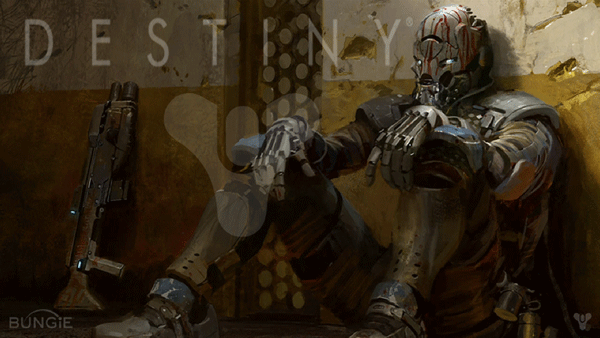
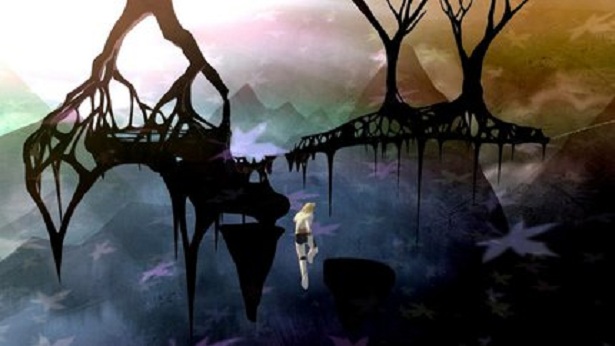
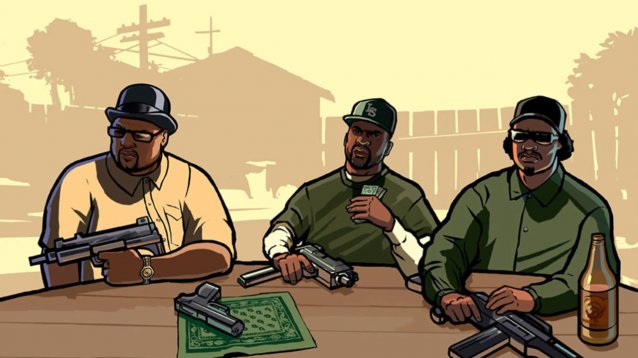 GTA: San Andreas Content Removal, DRM, and the Digital Future of Games
GTA: San Andreas Content Removal, DRM, and the Digital Future of Games Destiny: Festival of the Lost Guide
Destiny: Festival of the Lost Guide On Its Just A Game
On Its Just A Game Pokémon Rumble World (3DS) Codes
Pokémon Rumble World (3DS) Codes Architects Plans Walkthrough And Gameplay In GTA 5
Architects Plans Walkthrough And Gameplay In GTA 5